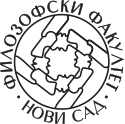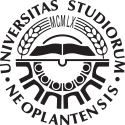- Benevolo, Leonardo: Grad u istoriji Evrope. Prevod: Snežana Milinković. Clio, Beograd, 2004. (Original title)
- Benjamin, Walter: A második császárság Párizsa Baudelaire-nél. = Angelus novus. Értekezések, kísérletek, bírálatok. Magyar Helikon, 1980. 820–931. (Original title)
- Gadamer, Hans-Georg: Az épületek és képek olvasása. = A szép aktualitása. Budapest, 1994. 157–168. (Original title)
- Gyáni Gábor: Az utca és a szalon. Új Mandátum Könyvkiadó, Budapest, 1998. (Original title)
- Flaker, Aleksandar: Književne vedute, Matica hrvatska, Zagreb, 1999. (Original title)
- Fonalka Mária: Pétervár szemiotikája az orosz irodalomban. Debreceni Egyetemi Kiadó, 2004. (Original title)
- Karahasan, Dževad: Pripovijedati grad. Sarajevske sveske, 2008, br. 21-22, 156-179. (Original title)
- Niedermüller Péter: A város: kultúra, mítosz, imagináció. Mozgó Világ, 20. 1994. 5. 5–17. (Original title)
- N. Kovács T.–Böhm G.–Mester T.: Terek és szövegek. Újabb perspektívák a városkutatásban. Kijárat, Bp., 2005. (Original title)
- Nora, Pierre: Emlékezet és történelem között. A helyek problematikája. AETAS, 1999/3.142–157. (Original title)
- Ože, Mark: Nemesta. Uvod u antropologiju nadmodernosti. Beograd, 2005. (Original title)
- Simmel, Georg: A nagyváros és a szellemi élet. In: Válogatott társadalomelméleti tanulmányok. Bp., 2001, 223–233. (Original title)
- Veres András: A közép-kelet-európai város, mint irodalmi toposz Konrád György regényeiben. = Kapitány Á.–Kapitány G.:„Jelbeszéd az életünk”. A szimbolizáció története és kutatásának módszerei. I. Bp., 1995. (Original title)
- Horváth Futó Hargita: Iskola-narratívák. Újvidék: BTK, 2009. (Original title)
|

